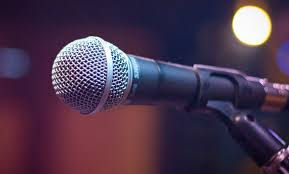Not All Mics are Created Equal: Which Microphone Is Best For Your Voice & Sound
- Voice by Chelsea
- Mar 2, 2022
- 3 min read
Updated: Sep 12, 2022

So you’re thinking about getting a live vocal microphone but don’t know where to begin. Whether it’s for at home use or an upcoming performance, knowing how microphones differ is key to getting the most out of your voice and sound. But wait, aren’t all microphones basically the same? The short answer is actually pretty straight-forward. However, there are distinct differences between them. Yes, all microphones are the same in the sense that they all perform the same function but how they do it is what we’re going to focus on in this month's blog.
In a basic sense microphones convert the sound and energy produced by your voice to an electrical signal which then gets reproduced by speakers. The important thing to remember when choosing a live vocal microphone is how it compliments your particular voice and sound. Some microphones have cheaper components in them that don’t reproduce your voice the way you’d want. Others may sound too bright and go against the tonal palette of your music.
Here are some common microphones and what makes them some of the most widely used live vocal microphones.

Shure SM58
This is one of the more iconic microphones in the entire music industry. Almost every singer who ever took the stage has sung into one of these. They are incredibly affordable and durable microphones which is a major reason why they are as popular as they are. The SM58 is not necessarily a high-performance microphone but for the majority of singers out there it sounds good, it’s reliable and it has a predictable response. Almost every sound guy out there knows what they’re going to get with this microphone and knows how to make it sound good live.
The Pros: Reliable, durable, overall good sound quality
The Cons: Vocals not as clear as they can be, does not handle higher volume levels, picks up more on-stage noise

Shure Beta 58
The Beta 58 is the upgraded version of the SM58. This is a much better performing microphone as it has a stronger magnet that responds better and handles higher sound levels. The sound produced by the Beta 58 is also much clearer and brighter. Another benefit of this microphone is that it primarily picks up sound only when it’s pointed directly at your mouth and leaves out any other noise that may be occurring on stage. As a singer this means you have to have proper microphone technique, if you turn your head away from the front of the microphone your volume will drop significantly. The plus side to this is that lowering the amount of external noise from the microphone means the sound guy will have an easier time fine tuning your vocals because there aren’t any other instruments or music coming through it.

Shure Super 55 Deluxe
The first two microphones I mentioned are considered “small-diaphragm” dynamic microphones. Small diaphragm microphones only capture a particular range of frequencies and therefore often do not capture a “full” sound. The Super 55 Deluxe has a larger diaphragm and because of this is able to capture both lower and higher frequencies resulting in a fuller, richer sound. The Super 55 Deluxe is a modern version of those classic jazz clubs/lounge microphones that you may have seen. The sound produced by this microphone is much warmer and typically has more bass. It’s been used in everything from jazz to blues and rock music. If you’re looking for something with a richer sound and a classic look this may be your microphone of choice.
So, the next time you’re at your local music store ask to try out some live vocal microphones and hear firsthand how it shapes your particular voice. You might be surprised to find just how different it can sound. At the end of the day just about any microphone will get the job done but, in an era when we’re all looking to stand out, go one step above and get a microphone that crafts your voice and makes it shine.

Comments